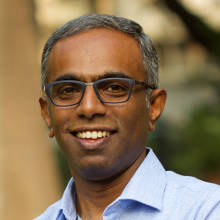[Photograph © Shi Deru (a.k.a. Shawn Xiangyang Liu) under Creative Commons]
Some time ago, a friend relocated from the US to Mumbai. He had a couple gas guzzlers in the USA and driving around was second nature to him. That he could drive here as well was a rather tall assumption he made. Indian roads and cars were quite unlike the ones he had come prepared for. Sitting beside me on the way back from the airport, he'd break into a sweat. Driving was an important part of his stay here. He had no choice but to learn. Every evening he used to drive around in my car. With me sitting by his side, calming his frayed nerves and struggling to keep mine within the car!
Every move, every gear shift, would be done with complete focus. We did that for a couple of weeks. Soon he was good to drive all by himself. Driving in India, for that matter driving in any part of the world is now second nature to him. Something that he does without consciously asking you if he is in first gear or second.
Noel Burch of Gordon Training International, developed a four stage model that explains this behaviour, or what goes into building competence in any skill.
a. Unconscious Incompetence (My friend from USA not knowing that he lacked the nuances of driving to India)
b. Conscious Incompetence (My friend becoming conscious of the fact that he has to work on it and build this skill to thrive here)
c. Conscious Competence (Him consciously working on it, and being very conscious every time he was working on the skills)
d. Unconscious competence (Now that he knows, he could 'zone out' while mechanically manoeuvring. It was almost second nature).
In an ideal world, everybody would like unconscious competence. Who doesn’t want to 'unconsciously stay on top of the game'? If any skill, be it scanning a patient's record, writing code or driving a car came 'naturally', who would say no?
But what we ought to think about is: when you engage in a task in any automated manner, does it really build expertise? Short answer: no. Areas we want to build expertise in, requires a different approach.
In 1993 Anders Ericsson and a team of psychologists published a wonderful research paper called 'The Role of Deliberate Practice in the Acquisition of Expert Performance'. Here, he introduced the idea of ‘deliberate practice’.
Practice, he argued, has to be 'deliberate' and cannot be 'automised'. There is no easy way out. The hours that go into practice is the base. Many a time, we falter and indiscipline sets in. The 'unconscious competence' zone that Burch described is where automised repetition becomes reality. And that is what we ought to seek to avoid. Question is how.
A couple of years ago, an entrepreneur friend of mine sought help. He needed some ideas to stoke his fresh entrepreneurial journey. Offering to host a round of conversations, he got a set of disparate but interested friends to converge every Saturday evening at his office and talk. For about 45 minutes, he would describe a particular industry that he had deconstructed from a few balance sheets, anecdotal evidence, first person accounts and the like. We'd listen, share our opinions and he’d absorb all of it in—sometimes pausing to scribble on a piece of paper. Every week, it used to be a different company or an industry. “Is there anything that I could have done differently?” he would ask at the end.
As much as the conversations were rich and inviting, I was intrigued by what was happening. One Saturday evening, my curiosity compelled me to reach early to find out what is really going on. It turned out, that he was told off by a venture capitalist (among others) for a lack of ‘business perspective’ despite having sound technical skills. He was told he wasn’t getting anywhere far with his venture. His conversations with a few others led him to believe that deconstructing industries and organizations was one way of learning and integrating different angles.
He turned his laptop around to show me a screensaver that blurted '4X4'. Four industries in four weeks. That was his target. He would read up on the industry, make notes and then deconstruct balance sheets of at least two organizations in the business. That industry, he would bring up for discussion in our weekly chat. He would talk to us of his understanding and listen to what he heard in response to what he was getting from us.
He had similar sessions with two other groups—an interested set of employees and another with family. Over two quarters, his understanding of what constituted the pulse of his own business changed dramatically. Four industries in four weeks. All of this of course, was in addition to nurturing his fledgling enterprise.
This is deliberate practice. For one, he was driven to put in the extra hours. He took it upon himself to keep aside his ego of being a successful technology professional. He dived deep to acknowledge areas beyond him. He put in extra hours to read and most importantly, stayed alive to any and all feedback. Of course, he worked on and changed his way of approaching another industry the next week. He wouldn’t give up. If he was hurt, it only showed in how strongly he came back the next week. Resolutely not giving up even when his deficits stood pronounced. In fact, seeking them out publicly gave it a different feel altogether.
Hard work by itself has such a halo around it. It is part of the work ethic of large swathes of populations around the world. By itself, it gets the world moving ahead. Often the pursuit of making a living supersedes the quest for expertise and excellence. Pausing to think about what we do, pondering on how we could possibly get better, actively be present to feedback that comes as a consequence of our actions and of course continue our pursuits can make the world around us a better place.
It reminds me of the time many years ago when my dad would conjure tricks to entice me to soak up household work. Cleaning windows was one such. The thought reeks of boredom now. But as a kid, the ‘adult’ activity was made super fun. Something to look forward to.
One bright summer day, when the windows were to be cleaned, I woke up early, and armed myself with 'equipment' in a manner commandos go to war. Equipment that ranged from buckets, brushes, cloth, detergent liquid and such else. At the appointed hour, dad parted the curtains and we were witnesses to dead houseflies next to the glass panes. He looked at me and asked how they got there. “It surely wasn't me,” I remember telling him. Half an hour (or some 'insanely long time') of questions and prodding later, he started on an elaborate story.
The flies, he said, were attracted to light. So much so that they were willing to give it all they had to get to it. So what if the glass pane came in their way the first time? They just went back, did an elaborate sortie of sorts and came tried again. And again. Until their heads couldn't take the repeated crashes. “Then they die.” I remember him ending with a flourish.
His point was simple. The flies weren't lazy. They worked hard and long on making those sorties to get to the light—their goal. But doing the same thing many times over is not the way to get to light. "If only they could 'think',” he said and his voice trailed off.
For many years, as I chose to approach several challenges and dilemmas with the ‘halo of hard practice’ as the only weapon in the armoury, he would quip “Why don’t you think about the problem?” A pause later, he’d add, “You remember the dead flies on the window sill don't you?”


Shankar Bharadwaj on Sep 01, 2015 7:34 a.m. said
Very Nice article , eye opener and connects with the issues faced by the Startups or guys who are stuck
Dayaanand Shanmugam on Aug 20, 2015 4:47 a.m. said
Totally concur Kavi with the views presented , and you have a lovely way of articulating the same ..!!